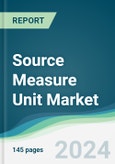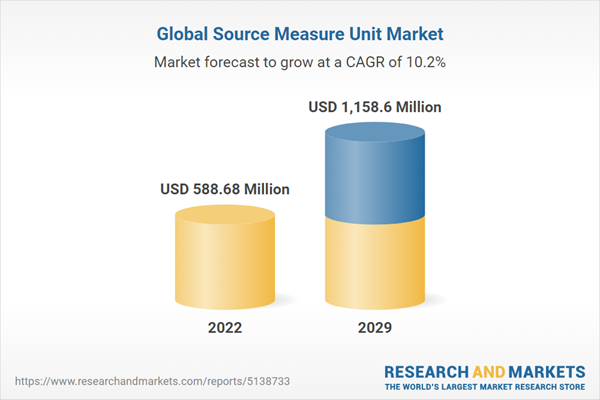The source measure unit market is evaluated at US$588.684 million for the year 2022 growing at a CAGR of 10.16% reaching the market size of US$1,158.600 million by the year 2029.
The source measure unit devices are instruments that are capable of sourcing voltage while simultaneously measuring the current. The demand for source measure units (SMUs) is increasing on account of their ability to support faster tests with improved accuracy as compared to the traditional methods. Simultaneously, the use of SMUs tends to eliminate the need for developing complex synchronization and connection using multiple instruments, which reduces the cost of ownership, in the long run, thus further propelling the growth of the market.MARKET TRENDS:
Numerous important factors impact the source measure unit (SMU) industry. For instance, the need for accurate testing and measuring equipment is fueled by the development of semiconductor technology and the widespread use of electronic gadgets, which is driving the SMU market's expansion. Furthermore, the emergence of new technologies like 5G, AI, and the Internet of Things (IoT) has made it necessary to impose strict testing standards on systems and parts, which has accelerated the use of SMUs due to their capacity to offer precise and adaptable testing capabilities.Additionally, the need for SMUs in automotive testing applications is driven by the automotive industry's shift to electric vehicles (EVs) and autonomous driving technologies, which need dependable testing solutions for battery management systems, power electronics, and sensor calibration. Overall, the source measure unit market is propelled by the development of technology, changing industry standards, and the growing need for accurate testing and measuring solutions across a range of industries.
MARKET DRIVERS:
Increasing use in the automotive industry is anticipated to upsurge the source measure unit market.
The automotive industry is expected to grow at a significant rate on account of the growing adoption of sourcing and measuring units to address the proper function of electrical parts in vehicles. The growing trend and adoption of self-driving cars and vehicle automation by manufacturers are further anticipated to propel the market growth opportunities during the forecast period.In addition, significant growth in the automotive industry coupled with increasing investments by key players in the market in the form of facility expansions and new manufacturing sites to boost their automotive production is also anticipated to propel the source measure unit market growth opportunities during the forecast period and beyond.
The rising government focus on producing electric and hybrid vehicles is expected to drive the market.
The increasing focus of the governments of numerous countries on the production of electric and hybrid vehicles is further leading to increased investments for booming electric vehicle production, which is also anticipated to positively impact the growth of the source measure unit market. For instance, the Made In 2025 program, which the government considers new energy vehicles (NEVs) an important part of the program, and the government is aiming to manufacture 1 million electric and plug-in hybrid cars in China by 2020.Growth in demand for precision measure units for device testing might positively impact the source measure unit market expansion.
The growing demand for precision source measure units for device testing in the telecommunication and consumer electronics industry is anticipated to propel the market growth for vendors and manufacturers during the forecast period. Expanding the manufacturing sector and rising government initiatives to promote the growth of consumer electronics manufacturing setups are anticipated to witness progressive growth opportunities for the source measure units market during the forecast period. For instance, in the United States, the Trump administration has announced policies favorable for the manufacturing sector, which has resulted in the year-on-year growth of total industrial production.MARKET RESTRAINTS:
There are several obstacles faced by the source measure unit (SMU) industry despite its encouraging development trajectory. Adoption of SMUs is severely hampered by their expensive cost, especially for small and medium-sized businesses with tight budgets. SMUs are expensive because of the advanced technology and precise engineering needed to produce them making them inaccessible to a wider range of consumers.Additionally, the variety of interfaces and communication protocols utilized by various SMU models and manufacturers may provide interoperability issues. This may make it more difficult to integrate with current instrumentation and test systems, which in turn prevents smooth functioning and compatibility. SMUs provide enhanced testing capabilities overall, but to realize their full potential and encourage broader usage across a range of sectors, these limitations need to be addressed by key players.
Asia Pacific is predicted to account for a significant share of the source measure unit market.
By geography, the global source measure unit market is segmented into North America, South America, Europe, the Middle East, Africa, and the Asia Pacific. The Asia Pacific is expected to hold a significant share of the market owing to the presence of established automotive and semiconductor industries in the region. In addition, rising defense budgets in countries like India and China, coupled with the growing adoption of source measure units in the healthcare industry, is further anticipated to boost the growth of the market in the region.The North American region is anticipated to witness significant growth on account of the early adoption of technology and growing investment in research and development by major market players in the region. Furthermore, the advent of 5G technology and the deployment of LTE networks coupled with the growing IoT market leverage precision for device testing is anticipated to boost the growth of the market in the region.
Market Developments:
- In July 2023, to expedite the characterization of integrated circuit (IC) designs, Keysight Technologies, Inc. introduced the PZ2100 Series High-Channel Density Precision Source Measure Unit (SMU) Solution. This new SMU solution provides digital development engineers with 20 precision SMU channels in a 1U rack space.
- In September 2022, a professional manufacturer of electronic T&M instruments, GW Instek, announced that it has officially entered the source measure unit equipment market with the launch of the new GSM-20H10 precision DC source measure unit. This move aims to highlight GW Instek's technological advantages and extensive experience in power measurement applications, as well as the development of 6 1/2 DMM.
Segmentation:
By Product
- General Purpose SMUs
- Application Specific SMUs
- Precision SMUs
By Current Range
- µa - 1 Ma
- Ma - 1 A
- Above 1 A
By Form Factor
- Benchtop
- Modular
By Industry Vertical
- Automotive
- IT & Telecommunication
- Aerospace & Defense
- Healthcare
- Others
By Geography
- North America
- United States
- Canada
- Mexico
- South America
- Brazil
- Argentina
- Others
- Europe
- Germany
- Spain
- United Kingdom
- France
- Others
- Middle East and Africa
- Saudi Arabia
- UAE
- Others
- Asia Pacific
- China
- Japan
- India
- South Korea
- Thailand
- Taiwan
- Indonesia
- Others
Table of Contents
Companies Mentioned
- Keysight Technologies
- Tektronix, Inc. (Fortive)
- Rohde & Schwarz
- Yokogawa Test & Measurement Corporation
- VX Instrument GmbH
- Advantest Corporation
- Premier Farnell Limited
- Chroma Ate, Inc.
Table Information
| Report Attribute | Details |
|---|---|
| No. of Pages | 145 |
| Published | February 2024 |
| Forecast Period | 2022 - 2029 |
| Estimated Market Value ( USD | $ 588.68 Million |
| Forecasted Market Value ( USD | $ 1158.6 Million |
| Compound Annual Growth Rate | 10.1% |
| Regions Covered | Global |
| No. of Companies Mentioned | 8 |









